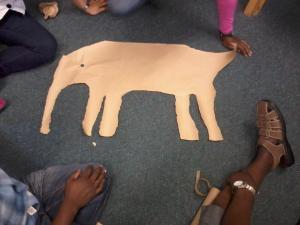 I love teaching a postgraduate course on community capacity building (SWRK6008). This year we have 64 students enrolled mostly from the Master or Graduate Certificate in Social Change and Development, but there are also students studying Early Childhood Education, Educational Studies, Leadership & Management in Education, Social Science and Public Health.
I love teaching a postgraduate course on community capacity building (SWRK6008). This year we have 64 students enrolled mostly from the Master or Graduate Certificate in Social Change and Development, but there are also students studying Early Childhood Education, Educational Studies, Leadership & Management in Education, Social Science and Public Health.
While the majority of them study online, there are also 6 workshops through the semester for students who can make it. Yesterday we had 26 students from 11 different countries (Australia, Philippines, Malawi, South Africa, Lesotho, Namibia, Ghana, Malaysia, Fiji, Vanuatu and Canada). What an amazing group of students.
The workshops are great fun. Because the theory and readings are covered online, the workshops focus on the practice of working with communities:
- Community capacity building
- Asset based community development
- Engaging communities
- Facilitating groups
- World Café
- Open Space
My approach is to treat the workshops as I would a workshop for practitioners. Most of the students are working and are looking for practical skills and the workshops are a great way to explore some of these. The first workshop was a bit of an overview of community capacity building and the strengths perspective (which the course is built on). We started by everybody introducing themselves – this took about 1/2 an hour (of a two hour workshop) but when we start working with a community, they first thing we need to do is to get to know people. I think it was time well spent and will help build the sense of community for the students. (I just wish all the students could make it to a workshop.)
The introductions also demonstrate the wealth of experience within the room and shows how spending time to discover the resources within a community is a valuable use of time. I provided a bit of a brief overview of community capacity building before having a bit of a brainstorm about what makes a community strong. (I love the different backgrounds – it was the first time that somebody mentioned Ubuntu.)
Because the course is built on strengths based approaches, I also spent a while introducing the strengths perspective. I find it fascinating when discussing strengths based approaches that it makes so much sense to people working with marginalised communities. Some people have some concerns that it is also important to recognise the needs of communities and the challenges they face. I agree and think we can still do this in a strengths based way where we ask questions that open up possibilities and ways forward, while also finding out what some of the issues and challenges are. I also think it important to combine the strengths perspective with a commitment to social justice.
We finished up with an exercise I love where participants had to make an animal out of a large sheet of paper. They were in groups of 4 or 5 and weren’t allowed to talk or to plan. In turn they would make a rip in the paper and then pass it on until they had an animal. Afterwards we had a discussion about how the exercise related to community capacity building – e.g., we have to be willing to let go of control, it really helps to have a vision of what we are trying to create, everybody can contribute, sometimes one part of the community will have a very different vision to other people and these visions might conflict (e.g., somebody rips off the part of an animal that somebody else thought was the head!).
It is an exercise that creates lots of laughter and is great for community building. As one of the students said, it demonstrates the importance of having fun together.
The course is offered by social work, but I have done it for them for the last few years. I feel quite lucky.
It’s going to be a great semester!





Hi,
It is wonderful that we have learned something new in our first workhop “UBUNTU” and His Exellency Mandela (former president of South Africa) explained it clearly.
What a wonderfull course!
LikeLike
Thanks Frans.
Nelson Mandela is certainly an inspirational man.
LikeLike